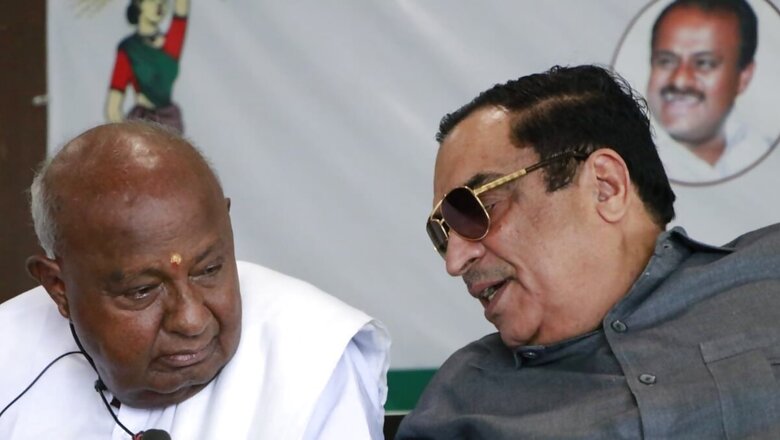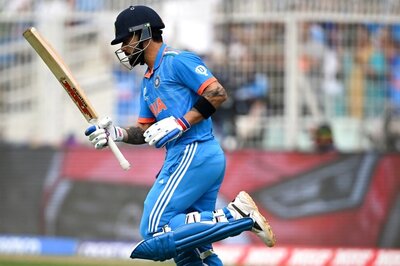
views
“I have CM in my name, I am a born CM and it is permanent. The other CMs are temporary. They will be former one day, but I will always be a CM, even after my death.” Former Union minister CM Ibrahim has shared this statement with this reporter many times.
This is how he loves to describe himself. Chand Mahal Ibrahim, or CM Ibrahim, has been a fixture in Karnataka politics for over 46 years. The colourful, controversial leader, who is known for quick wit, pun and repartee, is once again politically homeless.
JDS supremo and former prime minister HD Deve Gowda has sacked Ibrahim from the post of the party’s Karnataka state president for challenging his son HD Kumaraswamy’s decision to go with the BJP in the upcoming Lok Sabha elections.
Gowda, who is known for deft handling of any crisis, at 92, has once again demonstrated his absolute control over the struggling party. He has also reminded the cadre that family always comes first.
Ibrahim has lost the chair for punching above his weight, and this is not the first time he has got the boot for saying something unpleasant in public. Since 1978, he has been swinging between Congress and Janata Parivar, not staying anywhere for long.
Upset over not being made the Leader of Opposition in the Karnataka Legislative Council or Upper House, Ibrahim had quit the Congress to head the JDS in Karnataka, describing Deve Gowda as a “matured” leader in early 2022.
The same “matured” leader’s “immature”, as Ibrahim claims, action has rendered him homeless once again in less than two years.
Knowing too well that he will get the boot if he questions the Gowda family, Ibrahim challenged HDK to go down as a martyr who sacrificed power for secularism, argue those who have known the leader over the years.
There are rumours of him returning to the Congress and of his old friend Siddaramaiah willing to embrace him again. The ruling party might use him as one of the lead speakers at its rallies and campaigns.
With no mass appeal or followers, Ibrahim could do no bodily harm to the JDS, which has shed its “secular” colours to go with the BJP, which it used to dub as “communal”.
CM Ibrahim was born in Airani village in Karnataka’s Haveri district and was brought up in the steel town of Bhadravathi in Shimoga district.
A practising Muslim, Ibrahim studied Vachanas (devotional poems) of the Lingayat faith in school and often extensively quotes them to make a point. He did his primary schooling in a Lingayat Mutt. “The secular, liberal atmosphere of the Lingayat Mutt has deeply influenced me. I am a practising Muslim, who firmly believes in Basava Tatva (the preaching of Basavanna, the 12th-century founder of Lingayat faith),” he proudly says.
Ibrahim and controversies are inseparable. In 1978, he first entered the Karnataka Assembly as an MLA from Shivajinagar in Bengaluru. He became one of the trusted followers of the then chief minister R Gundu Rao and was made a minister in the 1980s. The loquacious Ibrahim once proudly displayed a Rolex watch at a public function, claiming it was gifted to him by a friend in the Gulf. The Opposition made a big hue and cry over it and Ibrahim had to tender his resignation to the Cabinet.
The alleged rape of a woman by one of his brothers in Bhadravathi made him unpopular and he could not return to the Assembly again.
After several run-ins with then Congress leaders S Bangarappa and M Veerappa Moily, Ibrahim defected to the Janata Dal led by HD Deve Gowda and Ramakrishna Hegde in 1994. After the party swept to power, decimating the Congress, the newly appointed chief minister Gowda made Ibrahim state president of the Janata Dal. Two years later, in 1996, he was made a Rajya Sabha member.
In a miraculous development, Gowda became the Prime Minister and Ibrahim was appointed as the Union Minister of Information and Broadcasting. It was his finest hour and Ibrahim created more controversies during his short stint at the Centre.
In 2010, Tata Group chairman Ratan Tata had alleged that a senior minister had demanded Rs 15 crore to let his company operate domestic flights in collaboration with Singapore Airlines in the 1990s. But Tata had refused to name the minister and the media speculated that it was Ibrahim, who had also held the portfolio of Civil Aviation. Ibrahim had denied the charges, demanding Tata to name the minister.
“Ibrahim was instrumental in bringing the Gowda government down. His distasteful comments on then Congress president Sitaram Kesari led to a breakdown of the relationship between Gowda and Kesari. Gowda lost the premiership, but Ibrahim continued as a cabinet minister in the IK Gujral government. That is Ibrahim for you,” said a former aide of Gowda.
During this period, one of his brothers was charged with an alleged rape in Bhadravathi and Ibrahim had to do a lot of contortions to save his coveted chair.
In late 2000, he returned to the Congress with his old friend Siddaramaiah, who was expelled from the JD(S). In 2013, he unsuccessfully fought the Assembly election from Bhadravathi and lost miserably. Siddaramaiah made Ibrahim an MLC and also deputy chairman of the Karnataka Planning Board.
Ibrahim, the Congress’s star campaigner between 2009 and 2021, created several controversies. “One of his most distasteful comments got me at least 50,000 extra votes in the 2014 parliamentary elections. He was so cheap and uncouth,” Shobha Karandlaje, now a Union Minister, had once told this reporter.
Even though Ibrahim claims and many genuinely believe that he has mastered the Vachanas, some of his critics feel that he is overrated person and his knowledge of the Lingayat faith is basic.
“He is a comedian, a joker. Not a serious leader,” said one of his old political friends.
Compared to two of his old Congress party colleagues and contemporaries KM Ibrahim and BM Ibrahim, CM Ibrahim has done quite well for himself. But his dreams of becoming a top leader of Karnataka’s Muslims remains a dream and most likely will be unfulfilled.
Irrespective of what he does, Ibrahim won’t be a CM. And he knows that well.



















Comments
0 comment